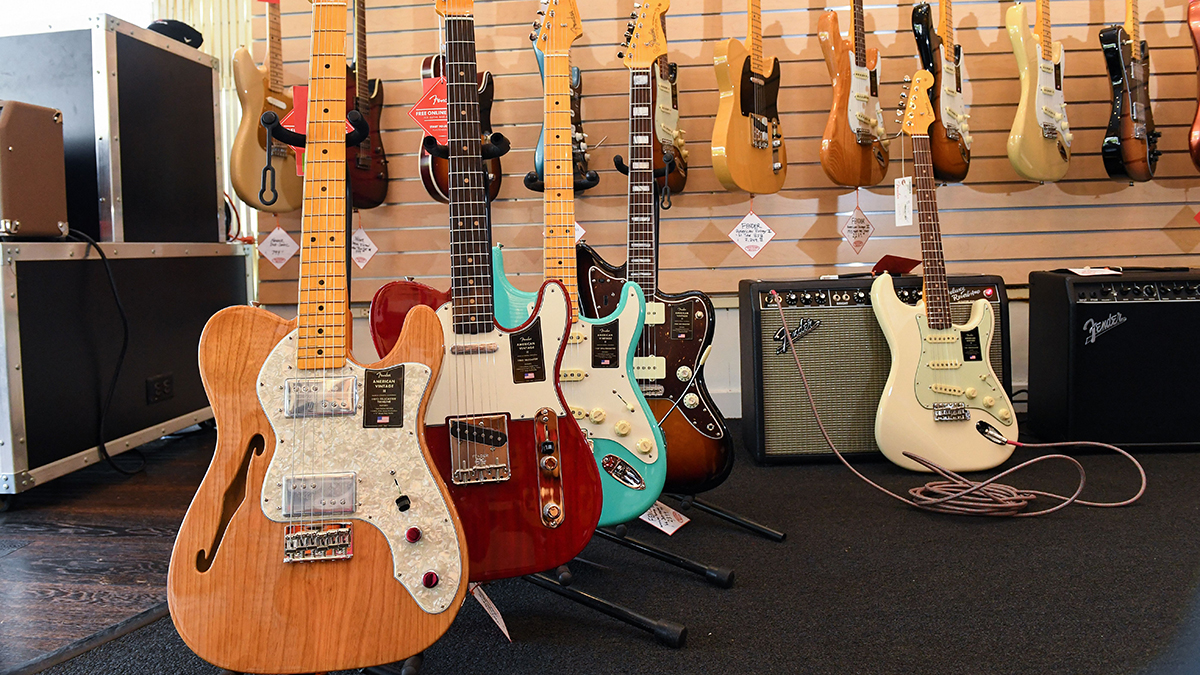“Uncertainty around tariffs may cause Fender’s operating performance to deteriorate more than we expect”: Fender has been forced to increase its prices to weather the tariff storm, according to new report
While sales to distributors have exceeded expectations, S&P Global suggests that consumers are leaning more towards the second-hand market amid increasing economic uncertainty

All the latest guitar news, interviews, lessons, reviews, deals and more, direct to your inbox!
You are now subscribed
Your newsletter sign-up was successful
Earlier this year, Fender's credit rating was downgraded by credit rating analyst Moody's, citing tariffs and increased financial pressures as key factors in its projection.
Now, according to financial information and analytics expert S&P Global, Fender increased prices throughout the first half of the year in an effort “to offset higher costs from tariffs, especially from China, which makes up 40% of purchases (half of which enter the U.S.).”
According to the report, Fender implemented a 5% price increase across its entire portfolio in an effort to weather the storm that has erupted following U.S. tariffs and broader global economic uncertainties.
The S&P Global report also notes that the sell-in (the sales from manufacturers to distributors) has exceeded expectations for retail partners such as Sweetwater, Guitar Center and Amazon, with higher-income consumers continuing to value the prestige of the Fender brand.
However, it adds: “Volumes continue to decline due to lower consumer discretionary spending, which we expect will continue throughout the remainder of the year.” S&P Global uses the example of smaller, locally owned U.S. dealers to illustrate this point, as such dealers continue to tightly manage their inventory amid a “weaker macroeconomic environment,” while consumers turn to the second-hand market or avoid discretionary spending altogether.
In relation to Fender's 5% price rise, S&P Global insists that the firm's approach to tackling such economic uncertainty has had some degree of success, proving to be more effective than some of Fender's closest competitors.
It continues, “Fender’s tariff mitigation strategy is proving more effective than competitors that have avoided price hikes and paused imports from China.”
All the latest guitar news, interviews, lessons, reviews, deals and more, direct to your inbox!
For its forecast of Fender's immediate and short-term future, S&P Global reflects, “In 2026, we expect improving volume trends from new innovations, though we continue to expect subdued consumer sentiment resulting in minimal revenue growth.
“We expect dealers will remain cautious on increasing inventory levels because of a weak macroeconomic backdrop with lower discretionary spending on big-ticket items like guitars.
“Moreover, since Fender depends on favorable holiday performance, [its] risk volume declines are greater than expected, potentially due to weakening consumer sentiment or greater competition from the secondhand market.”

The report concludes with an expected “negative outlook” for the guitar brand, citing “weaker consumer discretionary spending and some lingering uncertainty around tariffs, which may cause Fender’s operating performance and liquidity over the next 12 months to deteriorate more than we expect” in its assessment.
These findings align with current trends in the musical instrument market. According to a recent study by the Peterson Institute for International Economics, from January to July 2025, “U.S. exports of musical instruments were 8.4 percent lower than the average over the same months in 2021–24,” in particular in markets such as Brazil, Canada, and China.
This study emphasizes that this downturn is not primarily the result of retaliatory tariffs – at least so far. However, a mix of “factors linked to tariffs and broader trade policy uncertainty,” increased cost to consumers and decreased demand for leisure goods, and, in cases, “conscious substitution away from U.S. products” has eroded the demand for U.S. musical instrument exports.
In May, NAMM CEO John Mlynczak gave Guitar World an overview of the challenges the American musical instrument market is facing amid the current trade war.
Janelle is a staff writer at GuitarWorld.com. After a long stint in classical music, Janelle discovered the joys of playing guitar in dingy venues at the age of 13 and has never looked back. Janelle has written extensively about the intersection of music and technology, and how this is shaping the future of the music industry. She also had the pleasure of interviewing Dream Wife, K.Flay, Yīn Yīn, and Black Honey, among others. When she's not writing, you'll find her creating layers of delicious audio lasagna with her art-rock/psych-punk band ĠENN.
You must confirm your public display name before commenting
Please logout and then login again, you will then be prompted to enter your display name.

